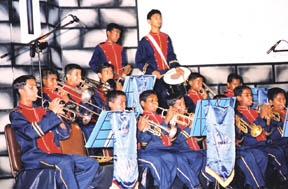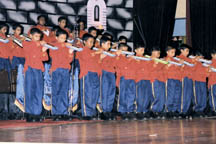
Programme to ease malnutrition
Malnutrition is a severe problem affecting children as well as
adults, especially in developing countries like Sri Lanka. Being
affected by malnutrition at a younger age can affect children throughout
their lives, as it will hamper their development both physically and
mentally.

The World Food Organisation (WFO) has been trying to provide relief
in this regard for many years, all over the world. As another step in
this direction, the WFO has decided to launch a programme to promote
nutrition among mothers and children in the Galle district.
Accordingly, dried food packets containing wheat and soya will be
distributed among the mothers and children in this area.
Five packets of dried food, each weighing 750 grams, will be issued
to pregnant women and feeding mothers, while two packets each will be
provided to children between six months and one year.
Children between the ages of one and three years will receive three
packets, while four packets will be given to those between three and
five years. The programme is expected to be effective from August 1 to
December next year.
It has also been decided to provide mid-day meals to children from
grades three to five, within selected schools in the south.A survey
conducted by the WFO on unsafe foods has revealed that 10 per cent of
mothers, 20 per cent of infants and 25 per cent of children in the
Southern Province are suffering from malnutrition.
Mangrove restoration project
All of you may remember reading about the massive damage suffered by
the Yala National Sanctuary due to the tsunami. Another aspect of this
sanctuary which was destroyed by the killer waves were the mangroves in
the Buthuwa Lagoon.
However, there's no cause for worry as steps have now been taken to
restore these mangroves. The World Conservation Association will
implement this mangrove restoration programme which will be funded by
the Government of Spain. The estimated cost of the project is over 1.2
million rupees.
The first stage of the project will see 25,000 kadol plants being
planted. Maha kadol, mal kadol and heen kadol plants obtained from the
mangrove resources at the Rekawa Lagoon will be planted at the Buthuwa
Lagoon.
Over a 100 members of the United Biodiversity Environment
Conservation Association will be involved in the mangrove restoration
project at the Buthuwa Lagoon.
Programme to protect heritage sites in the South
Sri Lanka is a country with a rich culture and heritage. Though we
may not appreciate it all that much, it holds international importance.
That is why foreign governments and other organisations lend us their
support to protect and preserve these important treasures.
The Government of the Netherlands has now stepped forward to assist
Sri Lanka with one such project. They have assigned 700 million rupees
(seven million US dollars) as a grant, to support the Southern Cultural
Triangle Programme, with the objective of preserving, conserving and
developing the heritage sites in the southern region.
The programme is a blend of several projects on cultural heritage and
economic development. The focus of this project is to develop the
Southern region in a sustainable manner by linking cultural heritage to
tourism.
Through the promotion of cultural tourism and getting the private
sector involved, especially in activities related to tourism, travel and
leisure, the Southern region will attract more local and foreign
visitors, which in turn will benefit the economy through the generation
of income and employment opportunities, and sustainable cultural
heritage management.
A highlight of the project is the construction of a regional museum
and visitor centre at the Kataragama Temple complex, which is visited by
people of all communities. It is expected to provide information on the
historical value of the area to the public, local and foreign tourists,
as well as schoolchildren.
The restoration and conservation of the ancient rampart and warehouse
of the Galle Fort is another important step.
The rampart is deteriorating fast, and needs urgent attention to stop
the destruction. Bringing the rampart to its original form will have a
positive impact on the world heritage city of Galle, which is the main
historic cultural tourist destination in the South.
The President has appointed a task force comprising public and
private sector officials to serve as a national committee, and to
monitor the overall planning and implementation of the Southern Cultural
Triangle Programme.
The Ministry of Cultural Affairs and National Heritage has been
assigned as the lead ministry to co-ordinate the implementation of this
development plan, with the support and collaboration of other relevant
ministries.
'Thurstanite Brass-2006'
'Thurstanite Brass-2006', the concert presented by the Western Band
of Thurstan College, Colombo will be held on July 15 at the BMICH.
This year too, the event has been organised in a grand way, complete
with dance acts and other aesthetic items.
|
 
Members of the band in action.
|
A main objective of this concert is to welcome the new leader of the
Western Band, and for the outgoing leader to officially hand over the
leadership to the newcomer. The two-year stint of the previous leader is
also appreciated. Displaying the talents of the junior band is another
objective of this concert. Cultivating an interest for Western music
among the student population is another aim.
The concert was organised for the first time in 2000, and has been
held once every two years since then. Ms. Kumuduni Dalpathadu, who is in
charge of the school's Western Band, Principal R. D. M. P. Weerathunga
and Vice Principal R. M. Jayasekera were instrumental in organising this
concert.
Tickets for Thurstanite Brass-2006 will be issued from the offices of
the school's past pupils' association and swimming-pool.
Indian army gets powers to protect wildlife
New Delhi: India plans to enlist the army to help protect its
threatened tiger population and other animals, giving soldiers the power
to arrest or even shoot poachers, officials said.
|

Half the world’s surviving tigers live in India.
|
The smuggling and sale of Indian tiger and leopard skins is common
across India's border with China, and poaching of endangered animals is
widespread throughout the country.
While the country's 1.1 million-strong army - the world's second
largest army after China - is deployed in many environmentally fragile
(delicate) border hotspots, troops currently have no powers to act
against wildlife crimes. Officials told Reuters the government was
planning to amend existing legislation to give the army powers to act in
border areas where smuggling and poaching is common.
"The amendments to the Wildlife Act will mean that the army will be
able to arrest, detain and even open fire on poachers who evade arrest,"
they said.
Conservationists say that India, which has half the world's surviving
tigers, is losing the battle to save the big cats.
Reuters
Free bicycles for postmen
The postman making his daily rounds in his bicycle is a familiar
sight to all of us, no matter what part of the country we may be living
in. But did you know that the delivery of letters in distant villages is
hampered due to the poor maintenance of these bicyclers used by the
postmen? But this might change soon.
The government plans to streamline the postal delivery system in
remote villages with the provision of free bicycles to postmen, before
the end of this year.
The bicycles currently used by postmen are government property, and
the government pays an annual allowance of Rs. 100 for the maintenance
of each bicycle.
This sum however, is not enough to keep these cycles in roadworthy
condition, and as a result, delivery of letters has got delayed on many
occasions.
Under the new programme, which has as its objective, the provision of
a streamlined postal service to the public, postmen will receive brand
new bicycles free of charge, so that they can perform their duties more
efficiently. |














